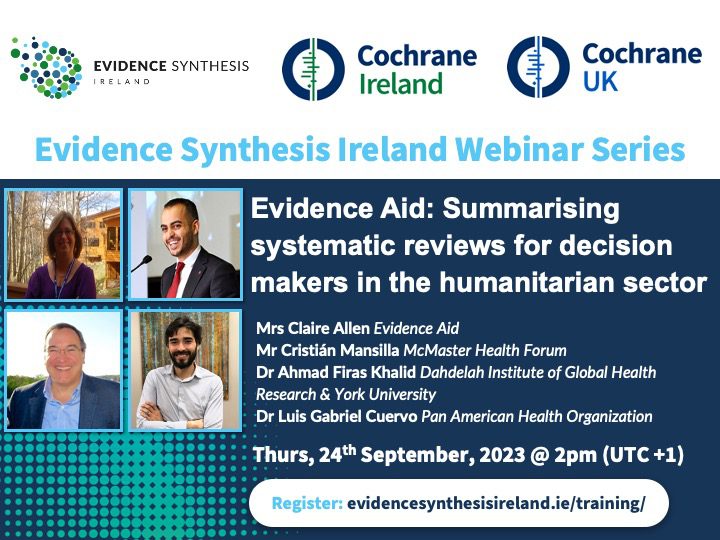Webinar: Mrs Claire Allen, Mr Cristián Mansilla, Dr Ahmad Firas Khalid & Dr Luis Gabriel Cuervo - Evidence Aid: Summarising systematic reviews for decision-makers in the humanitarian sector
Event Details
To register, click here How to extract, analyse and present data in scoping reviews can be challenging. This webinar will explore where and how you should
Event Details
To register, click here
How to extract, analyse and present data in scoping reviews can be challenging. This webinar will explore where and how you should extract the data from multiple evidence sources, the best approach in analyzing your collected data-including how to manage qualitative data, and novel ways to present your findings.
The webinar will start with an explanation of why and how Evidence Aid was established in 2004, and later became an independent charity in 2015. We will discuss why it’s important to summarise systematic reviews in a way that makes them usable for decision-makers in the humanitarian sector, how those summaries are written and how they have evolved over time, and how partnering ensures the evidence we are summarising supports the need and supports people in low and middle income countries. We’ll go on to discuss what decision-makers say about summaries and will showcase the Resilient Health Systems evidence collection before turning over the discussion to the audience who will be encouraged to ask questions either about the methodology or how the collection works.
Claire Allen: Claire has worked with Evidence Aid since its inception in 2004 after the Indian Ocean tsunami. She worked for Cochrane for 15 years overlapping with the time Evidence Aid was established within the family. When Evidence Aid became an independent charity in 2014/15, she moved over to become it’s first (and for some time only) member of staff. Claire is responsible for Evidence Aid’s programme of research resources and works with our committed Trustees, Advisors and Volunteers to ensure that our resources are usable, useful and used.
Cristián Mansilla: Cristián is a PhD student in the Health Policy program at McMaster University in Canada, and a research assistant at the McMaster Health Forum. He has dedicated an important part of his professional career to supporting health policy making processes, using the best available research evidence most recently leading the team curating Phase 2 of the Resilient Health Systems collection for Evidence Aid. He contributed to the development and implementation of several policies at the Ministry of Health in Chile and founded and led the Evidence-Informed Policy Making Unit at the Ministry of Health there. He has contributed to closing the gap between evidence production and uses by collaborating in important international projects and initiatives, such as EVIPNet and COVID-END.
Luis Gabriel Cuervo: Luis Gabriel Cuervo is a seasoned public health professional. He is a medical doctor who specialized in family medicine, a clinical epidemiologist. As a doctoral candidate in Biomedical Research Methodology and Public Health at the Autonomous University of Barcelona he is testing innovative approaches to measure and improve travel times to health services in cities with traffic congestion. Cuervo spearheaded the Cochrane Collaboration in Colombia and was a Senior Clinical Editor for BMJ’s Clinical Evidence. He advised WHO on integrating research evidence for the selection of essential medicines and has supported Evidence-Aid since its beginning, more recently in developing the Resilient Health Systems collection. Dr. Cuervo has been at the forefront of developing policies and agendas on research for health internationally, advancing social innovation and knowledge translation platforms, and setting norms and standards to increase the value of research for health.
Ahmad Firas Khalid (he/him): A medical doctor, assistant professor in global health at York University, a health policy and system researcher and lecturer, and a knowledge translation professional. Firas completed his medical degree at St. George’s University School of Medicine and his PhD in Health Policy at McMaster University. Firas worked as a Senior Research Manager at Evidence Aid working on creating a World Health Organization (WHO) Knowledge Hub on emergency disasters research management and with the Pan American Health Organization (PAHO) on the creation of Resilient Health Systems collection to advise member states. He is also a CIHR Health System Impact Fellow and a Mitacs Elevate Training Fellow working on Implementation of efforts to support real-time evidence use in humanitarian practice at The Canadian Red Cross. Firas is a Board Member for Doctors Without Borders where his responsibility is to set the strategic direction for the entire Canadian branch of the organization.

more
Time
(Thursday) 2:00 pm - 3:00 pm UTC+1
Location
ONLINE
